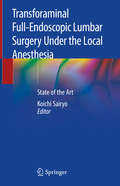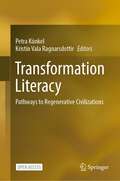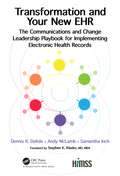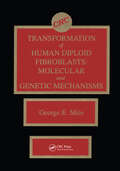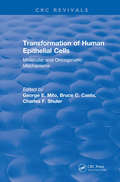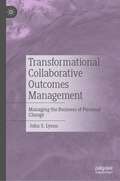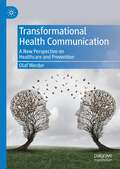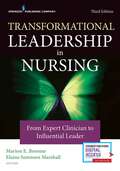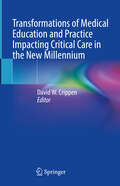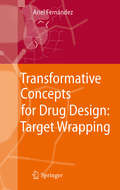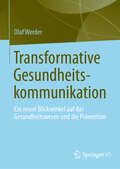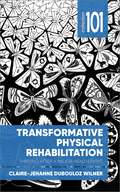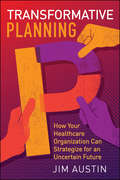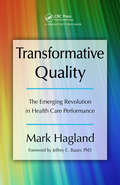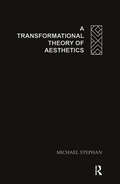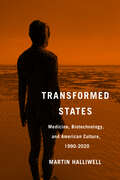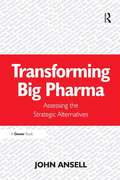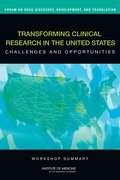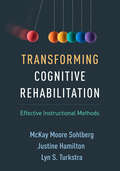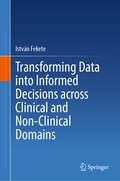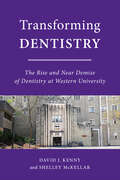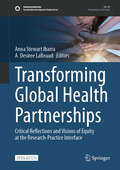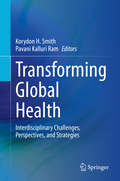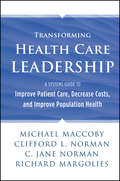- Table View
- List View
Transforaminal Full-Endoscopic Lumbar Surgery Under the Local Anesthesia: State of the Art
by Koichi SairyoThis book presents the latest devices and techniques in transforaminal full-endoscopic lumbar discectomy (TELD). This minimally invasive procedure can be used to treat various spinal conditions, such as herniated nucleus pulposus, discogenic pain, foraminal stenosis, lateral recess stenosis, and infection. The book offers an overview of TELD, and discusses discectomy, thermal annulplasty (TA) and other trending topics. It also explores the history and anatomy of transforaminal full-endoscopic lumbar surgery, complications, TELD techniques, and TELD and TA for athletes. As such the book provides a much-needed foundation for the further development of this increasingly widespread procedure. Transforaminal Full-Endoscopic Lumbar Surgery Under the Local Anesthesia is a valuable resource for orthopedic surgeons, clinical residents and medical students, alike.
Transformation Literacy: Pathways to Regenerative Civilizations
by Petra Künkel Kristin Vala RagnarsdottirThis open access book brings science and practice together and inspires a global movement towards co-creating regenerative civilizations that work for 100% of humanity and the Earth as a whole. With its conceptual foundation of the concept of transformation literacy it enhances the knowledge and capacity of decision-makers, change agents and institutional actors to steward transformations effectively across institutions, societal sectors and nations.Humanity is at crossroads. Resource depletion and exponential emissions that not only cause climate change, but endanger the health of people and planet, call for a decisive turnaround of human civilization. A new and transformative paradigm is emerging that advocates for regenerative civilizations, in which a narrative of systemic health as much as individual and collective vitality guide the interaction of socio-economic-ecological systems. Truly transformative change must go far beyond technical solutions, and instead envision what can be termed ‘a new operating system’ that helps humankind to live well within the planetary boundaries and partner with life’s evolutionary processes. This requires transformations at three different levels:· Mindsets that reconnect with a worldview in which human agency acknowledges its co-evolutionary pathways with each other and the Earth.· Political, social and economic systems that are regenerative and foster the care-taking for Earth life support systems.· Competencies to design and implement effective large-scale transformative change processes at multiple levels with multiple stakeholders.This book provides key ingredients for enhancing transformation literacy from various perspectives around the globe. It connects the emerging practice of stewarding transformative change across business, government institutions and civil society actors with the most promising scientific models and concepts that underpin human action to shape the future collectively in accordance with planetary needs.
Transformation and Your New EHR: The Communications and Change Leadership Playbook for Implementing Electronic Health Records (HIMSS Book Series)
by Andy McLamb Samantha Inch Dennis DelisleTransformation and Your New EHR offers a robust communication and change leadership approach to support electronic health record (EHR) implementations and transformation journeys. This book highlights the approach and philosophy of communication, change leadership, and systems and process design, giving readers a practical view into the successes and failures that can be experienced throughout the evolution of an EHR implementation.
Transformation of Human Diploid Fibroblasts: Molecular and Genetic Mechanisms
by George E. Milo Bruce C. CastoThis comprehensive publication draws together the important aspects of carcinogen-cell interaction. This interesting work describes the regulation of normal cell proliferation, cellular responses to carcinogen damage, the biologic consequences of cellular DNA modification, the structural and genomic changes resulting from carcinogen insult, and the possible involvement of such changes in the conversion of normal human fibroblasts to malignant cells. It presents current reviews with up-to-date literature references and provides critical information from leading investigators that is essential in understanding the biology of human cell transformation. This volume is especially useful to advanced students in genetic toxicology, molecular biologists, and all who are interested in the molecular and macromolecular changes in human cells leading to neoplasia.
Transformation of Human Epithelial Cells: Molecular and Oncogenetic Mechanisms (CRC Press Revivals)
by George E Milo Bruce C Casto Charles F ShulerThis book offers a conceptual explanation of the interrelationships that exist between the stages in the progression of initiated epithelial cells in culture compared with the diverse tissue of organs and the progression of tumors from different organ sites. The fate of the modification of adducts is discussed at the molecular level. The role that modifications in hot spots in oncogenes and supressor genes play at the molecular level and how these molecular modifications can lead to an explanation of molecular control in the formation of tumor phenotypes is also examined. Researchers in cell biology and toxicology, applied pharmacology, carcinogenesis, teratogenesis, mutagenesis, and molecular toxicology will find the book useful, interesting reading.
Transformational Collaborative Outcomes Management: Managing the Business of Personal Change
by John S. LyonsTransformational Collaborative Outcomes Management (TCOM) is a comprehensive, multi-level conceptual framework for system management and improvement. This book provides a comprehensive understanding of TCOM by using person-centered, collaborative processes for decision making.The issue with current human services systems is that there is a lack of access to care and that the system is focused on providing services as cheaply as possible. TCOM focuses on helping the greatest number of people while maximizing effectiveness. By fully understanding the nature of the business of helping, the author seeks to offer ways to create and sustain effective and positively evolving helping systems. He lays out a series of goal-directed social change processes which allow people at every level of a system to begin a shift towards transformational practice and the emergence of transformational systems.Building on three decades of work in a large community of scholars and practitioners, this book will represent the first full description of the conceptual framework and will appeal to an interdisciplinary group of scholars across nonprofit management, healthcare management, and social work.
Transformational Health Communication: A New Perspective on Healthcare and Prevention
by Olaf WerderThis book advances our understanding of communicative relationships and key barriers to more effective health communication. In this, it offers a humanistic orientation of health communication as well as its social, cultural, political, ethical, and spiritual dimensions and contexts. The book therefore brings a more inclusive and integrated approach to the major challenges and opportunities in contemporary health, medicine, and wellbeing.
Transformational Leadership In Nursing: From Expert Clinician To Influential Leader
by Elaine S. Marshall Marion BroomeProvides invaluable guidance for nursing graduate students to develop the skills necessary to transform healthcare through leadership within complex healthcare settings. The award-winning Transformational Leadership in Nursing: From Expert Clinician to Influential Leader guides nursing graduate students and professionals in the development of skills required to fulfill emerging leadership roles in our increasingly complex healthcare system. It provides a wealth of critical information, practical tools, creative vision, and inspiration to help facilitate leadership in a wide variety of settings. This expanded and updated third edition presents current challenges in healthcare and frameworks for becoming a transformational leader during times of change. Expert leaders discuss the tenets of collaborative leadership―networks, influence, and decision-making―as well as the creation of organizational environments and cultures to support practice excellence. The text will help readers master the skills necessary to work effectively across disciplines and generations; develop and implement strategic plans; design, implement, and evaluate practice models; build cohesive and effective teams; and lead across systems of care to resolve healthcare disparities and improve outcomes. This inspirational text fulfills the DNP Core Competencies, as described in the American Association of Colleges of Nursing (AACN) Essentials of Doctoral Education for Advanced Nursing Practice. New to This Edition: Outlines key leadership competencies for effective leadership in complex organizations Expands the scope of the healthcare economics and finance section to address the monetization of nursing innovations; expands coverage of population health strategies Features Leadership in Action vignettes and reflective questions to help students apply theoretical concepts to their own situations Includes updated tools, healthcare paradigms, and leadership inspiration Presents cases and reflective questions to help students apply the theoretical content to their own situations and generate discussion across cohorts of students Key Features/Benefits: Written expressly for APRNs transitioning into leadership roles Traces the trajectory from expert clinician to the role of leader in complex organizations and patient populations Utilizes Leadership in Action vignettes to highlight real-world application of concepts and strategies Provides learning objectives, reflection questions, inspirational quotations from noted leaders, and resources for further learning Includes ancillary PowerPoint slides Purchase includes digital access for use on most mobile devices or computers
Transformations of Medical Education and Practice Impacting Critical Care in the New Millennium
by David W. CrippenThere have been major changes in the Education of critical care providers in recent years. Some of these changes involve the psychology of “Generation Z” applicants, new technological training aids, the issue of training disadvantaged trainees, exploring the difference between diversity and equity as well as the rise of physician extenders, physician assistants and registered nurse practitioners. Many of these changes have a direct effect on the quality and quantity of new physicians entering the work force in the new millennium. Accordingly, these Emerging Issues will have a direct impact on how critical care trainees are selected and trained, directly affecting patient care. This Volume is structured To Illustrate three platforms, each resting on the platform below. The three main sections include medical education, Including The culture of medicine and critical care medicine in the new millennium. The first section includes Examinations of “Generation Z” and medical education, evolution of resident house staff, implications for onerous medical training costs, simulation models in medical education versus direct patient care, emerging providers in medical ethics and futuristic concepts for innovative medical education. The second section details politics, internet and social media use, the future of malpractice issues in health care, metabolic investigations at point-of-care, hope versus experience in long term ICU care and anti-vaxxers in the pandemic era. The final section details triage and ICU care of critically ill patients, algorithms that might replace clinical intuition, risks and benefits of artificial intelligence, music and the brain, ICU care during global pandemics, the rise of physician extenders, probability theory in interpreting clinical outcomes, new ideas in death by neurologic criteria as well as the future of death. Written by experts in the field, Transformations of Medical Education and Practice Impacting Critical Care in the New Millennium serves as a detailed guide for seasoned clinicians working to teach the new generation of critical care physicians.
Transformative Concepts for Drug Design: Target Wrapping
by Ariel FernandezIn spite of the enticing promises of the post-genomic era, the pharmaceutical world is in a state of disarray. Drug discovery seems now riskier and more uncertain than ever. Thus, projects get routinely terminated in mid-stage clinical trials, new targets are getting harder to find, and successful therapeutic agents are often recalled as unanticipated side effects are discovered. Exploiting the huge output of genomic studies to make safer drugs has proven to be much more difficult than anticipated. More than ever, the lead in the pharmaceutical industry depends on the ability to harness innovative research, and this type of innovation can only come from one source: fundamental knowledge. This book squarely addresses this crucial problem since it introduces fundamental discoveries in basic biomolecular research that hold potential to broaden the technological base of the pharmaceutical industry. The book takes a fresh and fundamental look at the problem of how to design an effective drug with controlled specificity. Since the novel transformative concepts are unfamiliar to most practitioners, the first part of this book explains matters very carefully starting from a fairly elementary physico-chemical level. The second part of the book is devoted to practical applications, aiming at nothing less than a paradigm shift in drug design. This book is addressed to scientists working at the cutting edge of research in the pharmaceutical industry, but the material is at the same time accessible to senior undergraduates or graduate students interested in drug discovery and molecular design.
Transformative Gesundheitskommunikation: Ein neuer Blickwinkel auf das Gesundheitswesen und die Prävention
by Olaf WerderDieses Buch erweitert unser Verständnis von kommunikativen Beziehungen und zentralen Hindernissen für eine effektivere Gesundheitskommunikation. Es bietet eine humanistische Ausrichtung der Gesundheitskommunikation sowie Einblicke in ihre sozialen, kulturellen, politischen, ethischen und spirituellen Dimensionen und Kontexte. Damit verfolgt das Buch einen inklusiveren und integrierten Ansatz zur Bewältigung der zentralen Herausforderungen und Chancen im Bereich zeitgenössischer Gesundheit, Medizin und Wohlbefinden.
Transformative Physical Rehabilitation: Thriving After a Major Health Event (101 Collection)
by Claire-Jehanne Dubouloz WilnerIn adult physical rehabilitation, the transformative learning theory presents the basis for a detailed model of Meaning Perspective Transformation in Physical Rehabilitation based on research evidence, with examples and cases, and presents directives for clinical applications. Transformative Physical Rehabilitation: Thriving After a Major Health Event draws from the theoretical background of transformative learning in adult education (Mezirow) to discuss the expansion and transfer of knowledge to clinical rehabilitation and community health rehabilitation settings for rehabilitation interventions. It also presents ground breaking findings of a fifteen-year research project on the process of meaning perspective transformation with client/patient groups. The project generated the first model of transformative change in the field of physical rehabilitation, built on the results of successive, externally funded research projects completed for the first time with various client populations undergoing interventions in occupational therapy, physiotherapy, and other physical health rehabilitation disciplines. The book is written for clinicians, educators, and students of physical rehabilitation, as well as for those who are interested in helping a loved one deal with personal change. Published in English.
Transformative Planning: How Your Healthcare Organization Can Strategize For An Uncertain Future (ACHE Management)
by Jim AustinTraditional strategic planning too often results in incremental change focused more on next year’s budget than on creative growth and sustainable development. Leadership teams struggle to “paint with two brushes”: building in transformative change while maintaining current operations. To transcend existing systems and achieve their organization’s unique vision, healthcare leaders must embrace uncertainty and incorporate flexibility into their long-term planning. They must prepare for a range of potential futures—while maintaining current operations—because agility and adaptability are what will define future success. Transformative Planning: How Your Healthcare Organization Can Strategize for an Uncertain Future explains how leadership teams can lay the groundwork for new, transformational healthcare delivery models while simultaneously meeting the requirements of today. Author Jim Austin shares the essential frameworks, tools, and processes for developing and implementing long-term strategic and execution plans that embrace uncertainty. The book’s four-step model for transformational change covers: Mental models, decision making, and decision trapsVision and strategic prioritiesStrategy development and scenario planningExecution frameworkLeadership teams and governing boards at healthcare organizations of all kinds will find Transformative Planning to be an essential guide to planning strategically for today and tomorrow.
Transformative Quality: The Emerging Revolution in Health Care Performance
by Mark HaglandAlways interesting and informed, national award-winning journalist Mark Hagland demonstrates how pioneering organizations are combining new tools with a new way of thinking to reinvent the way we deliver health care services in this country. Through exceptionally well-documented case studies, this insightful volumePuts the current journey towards
Transformatnl Theory Aesthetcs
by Michael Stephan Trevor PatemanFirst Published in 1990. How we perceive and respond to the visual image has been a traditional concern of psychologists, philosophers and art historians. Today, where the visual image increasingly permeates our everyday life and consciousness, the question becomes ever more relevant. How do we, for instance, instinctively ‘know’ what it is that a picture represents without having to be taught? How is it that we experience (aesthetic) pleasure in looking at certain pictures? How is it that we often want to talk about the pictures we look at? Such questions are currently asked by a wide range of disciplines, including: semiotics, psychoanalysis, anthropology, neuropsychology, and in general, contemporary critical analysis of the visual arts. In A Transformational Theory of Aesthetics, Michael Stephan breaks new ground by linking the findings of these areas. Drawing on their common area of knowledge, he has developed a radically new theory of picture perception and aesthetic response, arguing that images can generate in us a complex pattern of mental changes, or transformations. This is because the left and right hemispheres of the brain do not always work in harmony, hence the wide-ranging nature of aesthetic response to distinct art forms. A Transformational Theory of Aesthetics is essential reading to those seriously involved in linking the arts and cognitive sciences.
Transformed States: Medicine, Biotechnology, and American Culture, 1990–2020
by Martin HalliwellTransformed States offers a timely history of the politics, ethics, medical applications, and cultural representations of the biotechnological revolution, from the Human Genome Project to the COVID-19 pandemic. In exploring the entanglements of mental and physical health in an age of biotechnology, it views the post–Cold War 1990s as the horizon for understanding the intersection of technoscience and culture in the early twenty-first century. The book draws on original research spanning the presidencies of George H. W. Bush and Joe Biden to show how the politics of science and technology shape the medical uses of biotechnology. Some of these technologies reveal fierce ideological conflicts in the arenas of cloning, reproduction, artificial intelligence, longevity, gender affirmation, vaccination and environmental health. Interweaving politics and culture, the book illustrates how these health issues are reflected in and challenged by literary and cinematic texts, from Oryx and Crake to Annihilation, and from Gattaca to Avatar. By assessing the complex relationship between federal politics and the biomedical industry, Transformed States develops an ecological approach to public health that moves beyond tensions between state governance and private enterprise. To that end, Martin Halliwell analyzes thirty years that radically transformed American science, medicine, and policy, positioning biotechnology in dialogue with fears and fantasies about an emerging future in which health is ever more contested. Along with the two earlier books, Therapeutic Revolutions (2013) and Voices of Mental Health (2017), Transformed States is the final volume of a landmark cultural and intellectual history of mental health in the United States, journeying from the combat zones of World War II to the global emergency of COVID-19.
Transforming Big Pharma: Assessing the Strategic Alternatives
by John AnsellIn Transforming Big Pharma John Ansell addresses critically how strategy works in the pharmaceutical industry. The long-standing dearth of new products has led to a growing shortfall in revenues. Ansell assesses the wide range of alternative strategies big pharma companies have been pursuing in recent years in attempting to overcome this. He shows that there is sound evidence to expect the recent upturn in the number of new products reaching the market to go on to greater heights. Chapters assess the complex trends in attrition rates, show how rife spectacular sales underestimation in the industry remains, and explain how conventional wisdom on the chances of product profitability also seriously undersells the industry. The surest route to transforming the prospects for big pharma, Ansell contends, is to step up activity in acquiring and developing new products. This is now realistic because, as he shows, the amount of intellectual property available is much greater than it was a decade ago. Ansell believes that no other strategies have sufficient transformative powers, though they may be useful as a stopgap whilst the sales of forthcoming new products mature. He argues for a reversal of big pharma’s recent cutbacks in R&D and licensing, and re-focussing on new product development. Transforming Big Pharma is intended for those in senior and middle management in the pharmaceutical industry. It will also be valuable to students, as well as to all those dealing with the industry, including biotech companies and those providing services and products to the pharmaceutical industry.
Transforming Clinical Research in the United States: Challenges and Opportunities
by Institute of Medicine of the National AcademiesAn ideal health care system relies on efficiently generating timely, accurate evidence to deliver on its promise of diminishing the divide between clinical practice and research. There are growing indications, however, that the current health care system and the clinical research that guides medical decisions in the United States falls far short of this vision. The process of generating medical evidence through clinical trials in the United States is expensive and lengthy, includes a number of regulatory hurdles, and is based on a limited infrastructure. The link between clinical research and medical progress is also frequently misunderstood or unsupported by both patients and providers. The focus of clinical research changes as diseases emerge and new treatments create cures for old conditions. As diseases evolve, the ultimate goal remains to speed new and improved medical treatments to patients throughout the world. To keep pace with rapidly changing health care demands, clinical research resources need to be organized and on hand to address the numerous health care questions that continually emerge. Improving the overall capacity of the clinical research enterprise will depend on ensuring that there is an adequate infrastructure in place to support the investigators who conduct research, the patients with real diseases who volunteer to participate in experimental research, and the institutions that organize and carry out the trials.To address these issues and better understand the current state of clinical research in the United States, the Institute of Medicine's (IOM) Forum on Drug Discovery, Development, and Translation held a 2-day workshop entitled Transforming Clinical Research in the United States. The workshop, summarized in this volume, laid the foundation for a broader initiative of the Forum addressing different aspects of clinical research. Future Forum plans include further examining regulatory, administrative, and structural barriers to the effective conduct of clinical research; developing a vision for a stable, continuously funded clinical research infrastructure in the United States; and considering strategies and collaborative activities to facilitate more robust public engagement in the clinical research enterprise.
Transforming Cognitive Rehabilitation: Effective Instructional Methods
by McKay Moore Sohlberg Justine Hamilton Lyn S. TurkstraGrounded in cutting-edge knowledge about cognitive function and recovery from brain injury, this practical reference and text builds on the authors' influential earlier work, Optimizing Cognitive Rehabilitation. It incorporates major advances in the field to provide a new framework for assessing patients and developing individualized rehabilitation plans. The distinguished authors present principles and procedures for promoting engagement, teaching cognitive strategies and discrete facts and routines, introducing external cognitive aids, and supporting patients' social competence. Additional topics include considerations for using computer-based training, managing functional cognitive symptoms, and providing cognitive rehabilitation in the inpatient setting. The book features detailed case illustrations and filled-out examples of 19 reproducible planning and progress monitoring forms. Blank forms can be downloaded and printed in a convenient 8 1/2" x 11" size.
Transforming Data into Informed Decisions across Clinical and Non-Clinical Domains
by István FeketeThis book sheds new light on metrics like Minimal Clinically Important Difference (MCID) or Minimal Important Difference (MID) by discussing their application beyond traditional medical fields into non-clinical domains such as education, environmental studies, business analytics, finance, linguistics, economics, and biology. It addresses a significant research gap by demonstrating the utility of MCID/MID in enhancing decision-making processes across various scientific fields. The chapters cover topics such as the theoretical foundations of MCID/MID, methodological approaches for determining these metrics, and their application in diverse contexts. Readers will learn about the importance of MCID in assessing meaningful changes in speech therapy, biology, ecological restoration projects, and more. The book also explores the complexities of Health Technology Assessment (HTA), highlighting methodological diversities and the tension between universal and context-specific thresholds. Researchers in fields ranging from clinical medicine to social sciences will find this book invaluable. It offers insights into integrating MCID/MID metrics into telemedicine and remote healthcare while addressing underexplored areas in non-clinical research. This volume is a must-read for anyone interested in enhancing data-driven decision-making through meaningful outcomes.
Transforming Dentistry: The Rise and Near Demise of Dentistry at Western University
by Shelley McKellar David J. KennyThe history of the dental program at Western University is a spirited and gritty story of grand visions, strong personalities, and contentious leadership. Focusing on the years from 1965 to 2015, Transforming Dentistry highlights Western University’s ambitious plans to create and situate a dental program within a health sciences complex; the practical challenges involved in implementing a curriculum and populating a new school; the influence of key dental faculty, community dentists, and students in shaping the program; and the school’s near closure during the 1990s. David J. Kenny and Shelley McKellar detail how and why the training of dentists was transformed by science, technology, and individual educators. The book focuses on the unique aspects of Western’s dental program and compares it with the programs offered at nine other Canadian schools. Today, the strong reputation of Western dentistry is a direct result of the ambitious visions, professional commitment, and steadfast leadership employed by London dentists and university educators over more than five decades.
Transforming Food Environments
by Charlotte E.L. EvansWe regularly find ourselves in food environments that promote the consumption of high fat and sugary foods rather than encouraging us to eat more fruit and vegetables. However, because of increased media attention, people are becoming more interested in alternative approaches to improving the many food-related decisions we make daily. Transforming Food Environments features evidence from several disciplines exploring initiatives that have improved food environments and discusses the importance of achieving success in equitable and sustainable ways. The book presents information on diverse food environments followed by methods that help readers become aware of the design of interventions and food policies. It covers food environments in schools, workplaces, and community centres as well as fast food establishments and food marketing. The book presents methods to help encourage better food choices and purchase of healthier foods. It explores persuasion tactics used by health professionals such as changing availability and/or price, using nudging techniques, and food labelling. Led by Editor Charlotte Evans, Associate Professor of Nutritional Epidemiology and Public Health Nutrition at the University of Leeds; and written by an international range of authors from countries including the US, Canada, Australia, New Zealand, Japan and the United Kingdom, this multidisciplinary book appeals to students, researchers, public health professionals and policy makers. It also raises awareness and provides a comprehensive treatment of the importance of our environments on food choice.
Transforming Global Health Partnerships: Critical Reflections and Visions of Equity at the Research-Practice Interface (Sustainable Development Goals Series)
by Anna Stewart Ibarra A. Desiree LaBeaudThis is a book about the human experience of conducting global health research, linked to operational responses to the control and prevention of diseases worldwide. Rather than a manual or how-to guide, we propose a roadmap and vision of equitable, sustainable, and impactful partnerships shared through a rich interweaving of voices: North and South, academics and community practitioners, senior mentors and trainees, multiple generations, and multiple disciplines. We focus on the stories that need to be told, the successes and the failures, and visions for a healthier and more compassionate future for humanity.This book was written by more than 90 authors from 26 countries, bringing diverse perspectives on global health partnerships' past, present, and future. Although many of the chapters use examples related to infectious diseases, the ideas in this book are relevant to the broader field of global health research and practice.This book is organized into three sections, broadly related to foundational concepts, present experiences (case studies), and future visions. The first section focuses on the historical colonial legacy of global health and the foundations needed for equitable partnerships, introducing key themes explored throughout the book. These include concepts related to decolonization, ethics, gender, systems approaches and transdisciplinary science, Planetary Health, One Health, team science, and communication. The book's second section draws on case studies of global health partnerships to understand where we are today in global health. Authors share their experiences responding to global health threats, including disease outbreaks, refugee health, stigma, and sexually transmitted diseases, and post-disaster community recovery. The book's third section articulates a new vision for global health partnerships to co-create a more peaceful, equitable, and loving world. This vision is urgently needed to address the challenges emerging in the context of global climate change, the COVID-19 pandemic, and other human threats. This is an open access book.
Transforming Global Health: Interdisciplinary Challenges, Perspectives, and Strategies
by Korydon H. Smith Pavani Kalluri RamThis contributed volume motivates and educates across fields about the major challenges in global health and the interdisciplinary strategies for solving them. Once the purview of public health, medicine, and nursing, global health is now an interdisciplinary endeavor that relies on expertise from anthropology to urban planning, economics to political science, geography to engineering. Scholars and practitioners in the health sciences are seeking knowledge from a wider array of fields while, simultaneously, students across majors have a growing interest in humanitarian issues and are pursuing knowledge and skills for impacting well-being across geographic and disciplinary borders. Using a highly practical approach and illustrative case studies, each chapter of this edited volume frames a particular problem and illustrates how interdisciplinary problem-solving can address the greatest challenges in global health today. In doing so, each chapter spurs critical and creative thinking about emergent and future problems. Topics explored among the chapters include: Transforming health and well-being for refugees and their communitiesGoverning to deliver safe and affordable water The global crisis of antimicrobial resistanceLow-tech, high-impact interventions to prevent neonatal mortalityCommunicating taboo health subjectsAlternative housing delivery for slum upgrades Transforming Global Health: Interdisciplinary Challenges, Perspectives, and Strategies is a vital and timely compendium for any reader invested in improving global health equity. It will find an audience with researchers, practitioners, policymakers, and program implementers, as well as undergraduate and graduate students and faculty in the fields of global health, public health, and the health sciences.
Transforming Health Care Leadership
by Michael Maccoby Clifford L. Norman C. Jane Norman Richard MargoliesPraise for Transforming Health Care Leadership"The authors of this book provide the necessary tools for health care leaders to build a learning organization that can make the Triple Aim a reality-better patient care, at lower per-capita cost, while learning to improve population health."-Donald M. Berwick, MD, MPP, FRCP, president emeritus and senior fellow, Institute for Healthcare Improvement; former administrator, Centers for Medicare & Medicaid Services"This book is a must for every nurse leader's library and should be a resource and tool in every graduate nursing program, particularly those who are preparing doctoral students focused on systems leadership. It is full of experiential learning, and brings leadership to life."-Alexia Green, RN, PhD, FAAN, professor and dean emeriti, Anita Thigpen Perry School of Nursing, Texas Tech University Health Sciences Center"At a time when bold changes are necessary in the delivery of health services to improve outcomes and lower costs, the authors provide both compelling reasons for change and specific case studies of how it can be done. This is an important resource for leaders at every level in every part of the health sector today. It should be required reading for all those who want to improve the performance of their part of our medical enterprise."-John Rother, president and CEO, National Coalition on Health Care"Transforming Health Care Leadership is a well-constructed guide to transforming health care by creating transformational leadership. Anyone serious about improving health care-who has hope that we can actually succeed at making things better for our patients and communities while practicing good financial stewardship-needs to read this book."-Tony Joseph, MD, founder, The Healthcare Accreditation Colloquium
